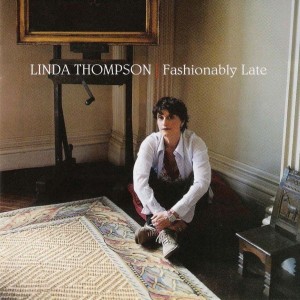 Linda Thompson still has all of the qualities that made her one of the most striking voices in English folk-rock in the 1970s and ’80s. Her new CD, her first recording in 17 years, puts all that’s best about her on display. She remains an excellent interpreter of other people’s songs, and a singer of subtlety and controlled passion. Even the title Fashionably Late evinces her wry, self-deprecating wit. And she has grown into a songwriter of some note as well.
Linda Thompson still has all of the qualities that made her one of the most striking voices in English folk-rock in the 1970s and ’80s. Her new CD, her first recording in 17 years, puts all that’s best about her on display. She remains an excellent interpreter of other people’s songs, and a singer of subtlety and controlled passion. Even the title Fashionably Late evinces her wry, self-deprecating wit. And she has grown into a songwriter of some note as well.
The former Linda Peters sang backup along with Sandy Denny on Richard Thompson’s first solo release after he left Fairport Convention. She went on to marry him and the two created some of the most enduring and critically acclaimed music to come out of England in the 1970s and early ’80s. Their marriage ended after the release of “Shoot Out the Lights” in 1982, and she put out one album, 1985’s One Clear Moment, before being silenced by dysphonia.
Now she’s back with a flourish, in fine voice and apparently finer spirits.
Fashionably Late is a family affair. She co-wrote five of the album’s 10 songs with son Teddy Thompson, who has also toured and recorded with Dad; Teddy also plays guitar and sings, as does his sister Kamila, and, wonder of wonders, Richard himself plays on the opening track.
“Dear Mary” is a catchy, loping waltz about a decidedly un-saintly gal whose sins are coming back to haunt her. The whole family joins in on the chorus, “Oh Mary, you may have to run…” to great effect, and Richard’s guitar filigrees add color as only he can.
The rest of the CD is dominated by the very sort of dour songs for which her ex-husband is tagged as a purveyor of doom and gloom: murder ballads, tales of love lost or love never found, and portraits of society’s flotsam and jetsam. It’s varied in tone, however, with touches of American country, Celtic traditional and English folk musics.
Linda and Teddy are joined by a solid cast of some of the era’s folk and rock greats. It’s a testament to the musical relationships she has forged and maintained through the decades, and to the respect these musicians have for her as a singer. They include members of the Fairport Convention extended family such as Dave Mattacks on drums, Jerry Donahue (Hellecasters) on guitar, and Dave Pegg on mandolin and acoustic bass guitar. American folk-rock great and multi-instrumentalist Van Dyke Parks contributes accordion and organ to a couple of tracks, and ancient-music mavin Philip Pickett plays crumhorns on one. Eliza Carthy plays fiddle and sings harmony on one, while Kate Rusby adds vocals on several tracks. Danny Thompson (no relation), who has toured with Richard as a duo and band member since the early ’90s, plays his jazz-influenced double bass on several tracks.
The most overt Celtic strains emerge on “The Banks of the Clyde” and “Nine Stone Rig,” the former by Linda, the latter by Linda and Teddy. “Clyde,” the sad ballad of a woman who turns to prostitution to feed herself (similar to Townes Van Zandt’s “Tecumseh Valley”), is a stripped-down affair on which she is backed only by John Doyle’s lovely finger-picked guitar and Kathryn Tickell’s Northumbrian small-pipes. “Nine Stone Rig” based on an old Scottish ballad, again with just Doyle’s guitar plus Danny Thompson on bass, sounds like a track from an early ’70s Pentangle record.
“Paint & Powder Beauty,” which Linda co-wrote with Rufus Wainwright, is a lightly swinging bit of chamber pop, with accompaniment from Martin Carthy on guitar and a string sextet. Musically, it could stand beside Richard’s “Al Bowlly’s in Heaven,” and it even contains what may be a lyrical reference to one of his best-known songs, “When the Spell is Broken”: “She’s only a paint and powder beauty/she’s the queen of the masquerade ball…/when the spell is broken, she’s nothing at all.”
The only cover song is a beautiful rendition of Lal Waterson’s “Evona Darling,” with Teddy and Linda sharing lead vocals over Parks’ tastefully played keyboards.
The most overt reference to Richard comes in the final track, “Dear Old Man of Mine,” which opens with the line “Here’s to the man that we thought was dead/singing like he’s got a gun to his head/hanging on sweet notes and a thread…/” and goes on to toast “Here’s to the dreams that went awry/and to the tears I could not cry.” It’s a chillingly intimate song, delivered in Thompson’s trademark husky alto, which catches in just the right places, and recorded in a manner that makes it seem she’s whispering the song into the listener’s ear.
Perhaps it’s a blessing that Linda Thompson lost her voice when she did; the direction she was going with her first solo recording and the production trends of the late ’80s and early ’90s could have rendered her just one more faded pop diva. Instead, after a tantalizing wait in which most of her fans had resigned themselves to never hearing her sing again, we get a rootsy and unpretentious CD that delights us with its maturity and vitality. There may be nothing here to rival “The Great Valerio” or “Did She Jump or Was She Pushed,” but it’s still a breath of fresh air, a compelling record from a woman with nothing to prove, who nonetheless proves that she still knows her way around a song.
(Rounder 2002)
